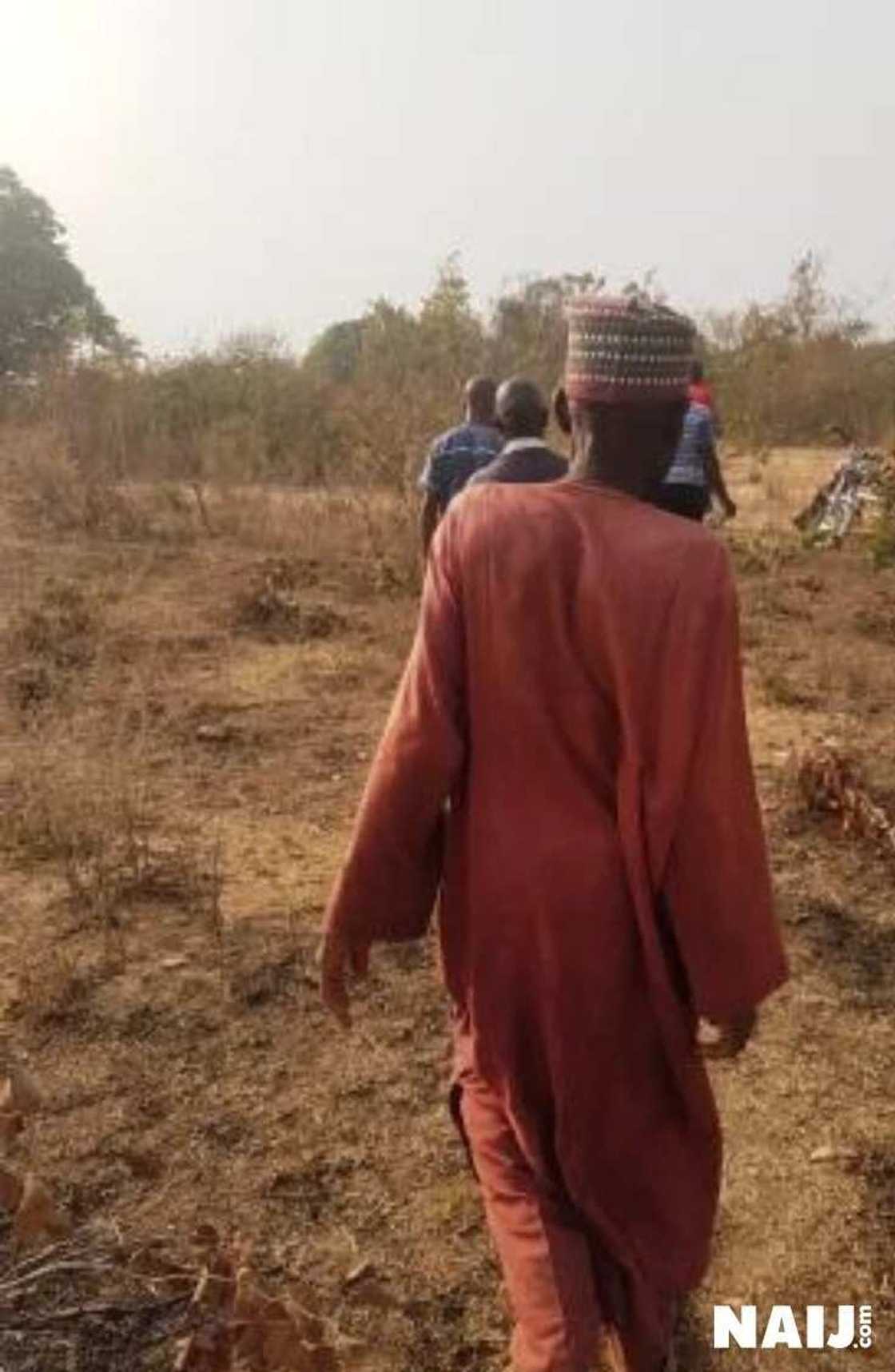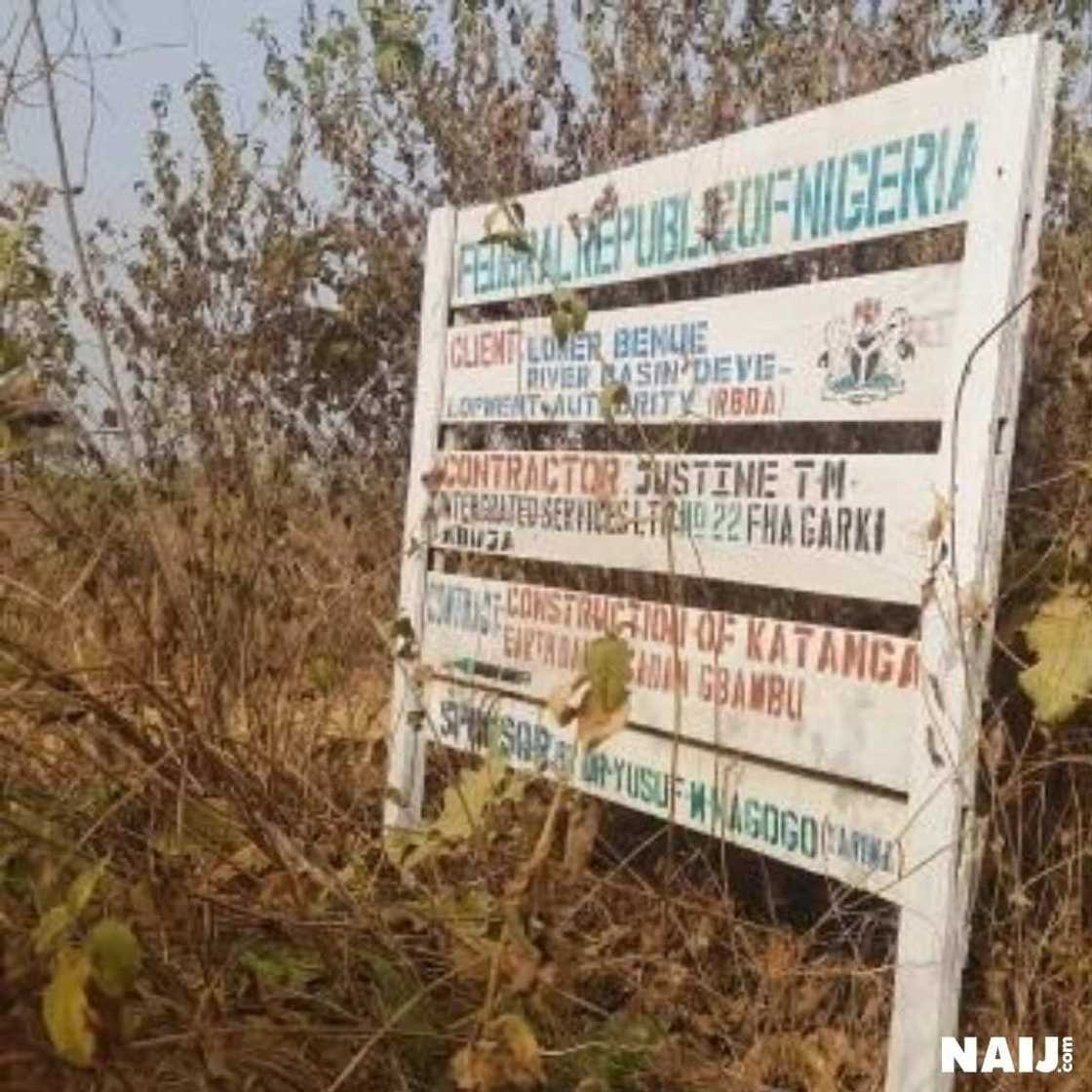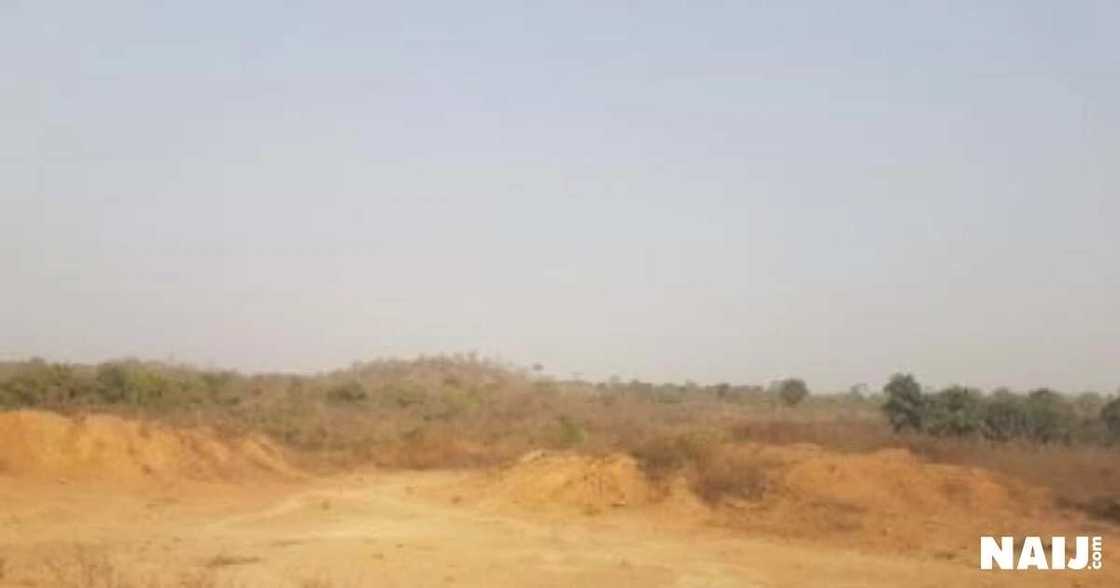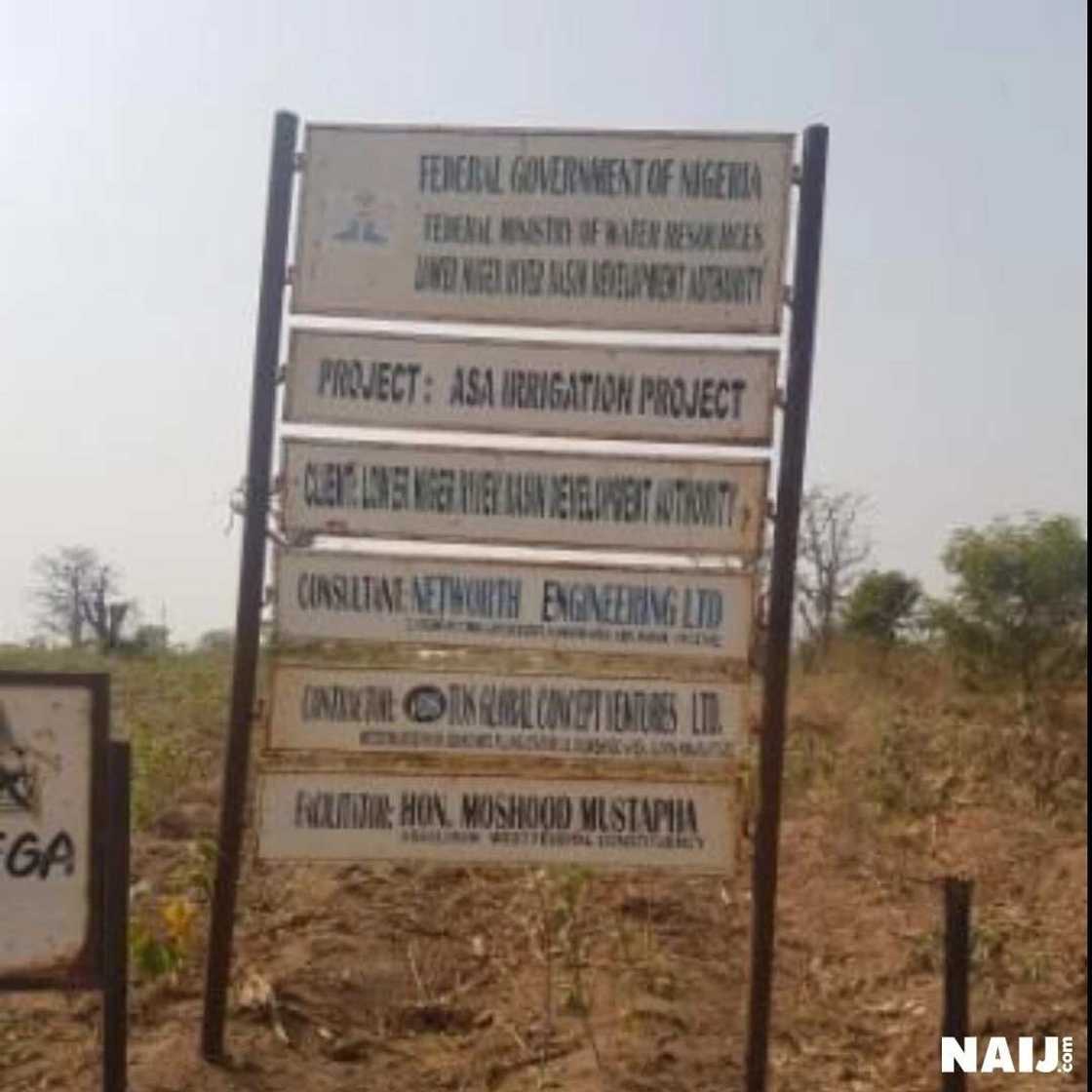Investigation: How irrigation projects get abandoned in Nigeria
Editor's note: Nigerian farming communities lack access to water for dry season farming despite billions of Naira spent on dams and irrigation projects.
In most rural communities in Nigeria, farmers are often out of job during the dry season due to poor access to water. This invariably implies that a large chunk of Nigeria’s arable land is not cultivated even when the country struggles with poverty and food insecurity.
A three months’ investigation by Olajide Adelana revealed how inefficiency and mismanagement of resources by the country’s river basin authorities may worsen food insecurity.
It is very rare to see Mohammed Usman take a day off from his farm. But whenever he does, he will sit under a shade opposite his house, and acknowledge greetings from villagers who have known him long enough as Sa’in Wamba - the local title of the right hand man of the Emir of Wamba in Nassarawa state.
But things have changed in recent times. He is now a regular figure at the spot since his farming endeavour reduced drastically.
His compatriot, Umar Abubakar lives in Ballah, Asa local government area of Kwara state. His daily routine starts with a quick bath at about 5.00am after he must have said his prayers. His prayers are an easy guess; a bountiful harvest and good weather for his crops.

Thereafter, he picks up his farming tools and head out for his farm. It is a few minutes away but he would rather not have his breakfast at home. To him, “breakfast is best eaten at the farm” after he must have done appreciable farm work.
READ ALSO: ACF assesses, scores President Buhari’s administration
But now, he is usually seated under a mango tree opposite his house, fanning himself, and jumping at every discussion that catches his fancy.

Usman and Abubakar are among the growing numbers of Nigerian farmers frustrated by lack of access to water for irrigation despite billions of Naira spent by the federal government on the construction of dams and provision of irrigation system.
Abandoned irrigation projects now recipes for frustrating rural farmers
There is a pattern synonymous with project abandonment in Nigeria especially irrigation projects situated in rural and hard to reach areas.
A close guess would start with a Federal Executive Council (FEC) meeting on a Wednesday in Abuja. The president walks in. The national anthem comes thereafter. Prayers are said and then discussions commence behind closed doors. Hours later, ministers and presidential aides throw banters at each other as they reach for the door.

SEE ALSO: Interactive map of the dams in Nigeria
The meeting had just ended.The press is later briefed about bogus monies approved by the FEC for the construction of dams and irrigation projects across the country.
Accolades pour in. The government is commended for its efforts towards achieving food security. But few years later, it is a sorry case.
There are no dams; neither are the irrigation schemes working and farmers fare even worse.
The above scenario may not be far-fetched from what played out when the contract for the construction of a dam in Katanga, Wamba LGA, Nasarawa state was awarded to Justines T.W Integrated Services Limited on October 1, 2012, at the sum of ₦184,776,825 to provide water for irrigation for the community.
“They came and told us that the project will solve the problem of water in our community. I think they even laid pipes saying they will supply the community with water for domestic use but all they did afterwards was nothing. There was no water for people to farm during dry season neither did we see water running in our houses,” says Hassan Mohammed, who has been farming in the area for over two decades.

However, more than five years later, the community which boasts of seasoned farmers of cassava, yam and soya beans is even more handicapped as displaced farmers including Usman whose landed properties had to give way for the construction are yet to benefit from the project.
A visit to the project site awarded by Lower Benue River Basin Development Authority (LBRBDA) revealed that the project has been abandoned as there was no evidence of the contractor’s presence at the site asides from heaps of sand and excavation said to be carried out for embankment. There was no project office, neither was there any equipment on the site.
At the moment, over 40 hectares of arable land which has the capacity to produce 300 large bags of maize per hectare, 600 bags of cassava per hectare and sugarcane worth ₦500,000 is estimated to be lying fallow, says Jemilu Mohammed, who has been farming in the area for over two decades.
“I can remember very well. How they came sweet-talking us to give our land for free. They told us it for our good. I had some economic trees like palm tree and mangoes on my land. They destroyed everything and started excavating sand.
"They promised to compensate me and agreed to pay me ₦600 per tree but they didn’t fulfill their promise. I lost my land, I can’t farm as I used to and yet I was not properly compensated. But why did they leave like that? Why did they destroy our trees when they know they won’t finish their work?” Usman Mohammed, who is a member of the community’s council of chiefs asked.
Usman’s questions are not new.
Nigeria has, in the past tried different strategies aimed at addressing food insecurity. These strategies amongst others were to help develop Nigeria’s water resources and prevent droughts and famine.
Ultimately, this led to the establishment of River Basins Development Authorities (RBDAs) in 1973 to harness the nation’s water resources for irrigation, domestic water supply, hydro-electric power generation, enhance agricultural resources for food sufficiency and also bring development closer to the grassroots.
From having 2 RBDAs namely Chad and Sokoto-Rima River Basin Authorities in 1973, Nigeria now has 12 RBDAs with widespread coverage of the 6 geo-political zones.

SEE ALSO: Timeline of the abandoned dam projects
But despite these efforts and with the country’s 84 million hectares of arable lands, and nearly 279 billion cubic meters of surface water to drive all year round farming activities, Nigeria is still largely ensnared in rain fed agriculture and one seasonal farming period.
River Basins: Scars of disappointment on farmers’ faces
The RBDAs have largely failed and their fondness for awarding bogus contracts is seemingly matched only by the high magnitude of failed, abandoned, and underutilized projects, wasted funds, and scars of disappointment etched on the faces of supposed beneficiaries, investigation by this paper reveals.
Investigations across states of Kwara, Nasarawa, Enugu, and Adamawa show that the implementation of dams and irrigation projects has been anything but effective.
The Katanga dam project is one of such projects and the Fiscal Responsibility Commission (FRC), an agency saddled with the promotion of transparent and accountable government financial management alludes to this in its 2017 nationwide verification report.
The contractor, Justines T.W Integrated Services Limited, according to the report, applied for a power of attorney to transfer the contract to Kadalux Global Resources barely two years into the project. This was approved on 14th October 2014.
Thereafter, Kadalux declined the power of attorney and transferred back to Justines T.W on 11th January, 2016. Despite the back and forth, the report said, “LBRBDA provided funds for the project in 2015 but the contractor did not mobilize to site.”
The FRC report also went on to recommend that the project be revoked and re-awarded to a more competent contractor and that all government monies advanced to the contractor for which commensurate work was not done be recovered. But several weeks after, the contractor is yet to return back to site neither is there evidence that monies have been recovered.
Confronted with the findings of thisinvestigation over the telephone, the site engineer referred to as Engr. Alam by the locals, sternly warned the reporter not to disturb him and that all queries should be directed at the contractor, LBRBDA or the federal ministry of water resources (FMWR). He then ended the call abruptly.
When contacted, LBRDA Public Relations Officer, Mrs. Abata denied knowledge of the project and asked that further inquires be directed at Engr. Dan Hendrick who she claim knows about the project.
When contacted, Engr Hendrick who didn’t deny knowledge of the project would not respond to inquiries but rather asked for more time to get back to the reporter. After close to two weeks of back and forth, it became apparent that Engr Hendrick was not willing toprovide any relevantinformation concerning the project.
As far as this investigation can determine, Justines T.W Integrated Service Limited has no office. In its registration details, the company gave 15, Road 6, Federal Housing Authority Phase II, Lugbe, Abuja, as its official address. But inquires showed that the address does not exist.
A Freedom of Information (FOI) request sent to the ministry asking for the procurement details of the project got no response within the first 7 working days as stipulated by the FOI Act. The only response received from the ministry was an acknowledgement letter a month later stating that the request has been forwarded to the appropriate quarters.
Justines T.W Integrated Services Limited is not the only one in this mould.
Further up north in Kwara, precisely at Ballah, Asa LGA, Global Concepts Ventures Limited did something similar –if not worse.
What started in October 2012 as a contract for the provision of irrigation infrastructure to farmers on 25 hectares of land in Ballah has become a local reference for frustration.
The contract awarded by Lower Niger River Basin Development Authority (LNRBDA) to Global Concepts Ventures at a sum of ₦99,606,937.50 for a period of 2 months is a constituency project by a former member of the House of Representatives, Asa/Ilorin West Federal Constituency, Hon. Moshood Mustapha. The project was conceived to ameliorate the sufferings of farmers in the community who are often out of job whenever the dry season sets in.
But it has hardly done that. More than 5 years after and with over ₦90 million allegedly paid to the contractor, the project is yet to be completed.
That is not the only problem. The contractor did not make provision for irrigation infrastructures, a visit to the site shows.

And this was not an omission. River Aro, the source of water for the project isn’t perennial –does not flow throughout the year – and could not have been suitable for irrigation during the dry season. This puts to question whether proper feasibility study was carried out before the contract was awarded.
Mustapha said the initiator of the project however thinks otherwise. He said the project was conceived with the best of intentions and that provisions were made for the construction of boreholes which is expected to supply farmers with water whenever the river dries up. Even then, findings revealed that the borehole drilled is not functional.
Abdullahi Adetunde, lives and has been farming in Ballah for over 20 years. He chronicles how the project raised his hopes and dashed it in the same proportion.
“In 2012 when the contract was awarded, we farmers were hopeful. We were happy that we are going to have some water to plant crops during the dry season and sustain our business but this is 2018 and the project is far from completion. Instead we suffer more,” Abdullahi Adetunde, disclosed with the help of an interpreter.
Alhaji Olarongbe Abdulkadir is the district head of Ballah. He said the only information he is privy to about the project was when the contractors approached the community for land.
“Asides from when they came to beg for land there is little that I can say about the project. You can go into the community and ask people affected by the project. I don’t know why government is often in the habit of awarding contracts without carrying traditional leaders of the host community along.”
The land, according to local sources, was revoked by the owners and reallocated to farmers when it became apparent that the contractor was not keen on completing the project. Efforts to reach the company proved abortive as there was no website or phone numbers to call.
Again, FOI request asking for details of project from the ministry got no response within 7 days as stipulated by the FOI Act. A response however came a month later acknowledging receipt of the request and that it has been sent to the appropriate quarters.
Corruption: An old wine in a new bottle?
Even by the ever crashing level of probity in public life, the sheer magnitude of the money mismanaged, embezzled and siphoned by the politician-bureaucrat-contractor nexus in Nigeria is stunning.
The UK Department for International Development estimated that Nigeria lost a staggering $32 billion to corruption during the past administration of President Jonathan. However not much has changed under the current administration of President Buhari despite his popularity and frugal personality, critics say.
According to a new report by Transparency International, the perception of corruption in Nigeria has worsened between 2016 and 2017. In the report, Nigeria ranked 148 out of 180 countries assessed in 2017 on parameters such as perception of corruption, and the annual corruption perception index.
The agricultural sector is not spared. Just like most sectors, the agric sector has gone through the ridicule of promises made and unfulfilled by politicians.
The consequences are not far-fetched.
Some few months ago, precisely March 2017, the Food and Agriculture Organization said that about 7.1 million people in Nigeria are facing acute food insecurity and require urgent life saving and livelihood protection. To be on the right path of food security, experts believe that there is need for Nigeria to stimulate growth in the agricultural sector and address issues of corruption around it.
Abba Aminu, professor of agricultural economics at Bayero University in Kano, believes that Nigeria will always be in danger of food crisis until all efforts are galvanized towards fostering policies that would prioritize increased agricultural output to cater for the country’s increasing population and engender food sufficiency and sustainability.
“We have so many river basins development authorities around but the problem is efficiency and maintenance is very poor too. Water flow in every irrigation scheme is important and is supposed to be maintained regularly but that is not so.
“Also there is the issue of having the right policies. Policies should be geared towards encouraging local participation and empowerment of rural farmers to engage in modern farming techniques. For irrigation schemes to be more effective there is need to adopt and adapt the World Bank’s participatory irrigation management method where cost sharing is encouraged and everyone has a stake in the project,” Abba says in an interview.

Wale Oyekoya is an experienced farmer and consultant. In an interview with a local newspaper, he believes the problem of leadership, mismanagement, embezzlement and corruption must first be tackled head-on before Nigeria can begin to witness agricultural industrialization.
To kick start this process, Nkemdilim Ilo, the acting chief executive officer, Public Private Development Centre (PPDC), says government must adopt and implement the right procurement process that will ensure resources are well managed, and a wider participation from citizens is promoted.
She says the picture painted so far does not look encouraging and that if anything must change soon, it must be a firm commitment and holistic approach to curbing corrupt tendencies and practices by adhering strictly and exhausting the provisions of the 2007 Procurement Act. Sadly, this commitment, going by what is obtainable doesn’t seem to be happening soon.
However, as the government foot drags on the issue, farmers might have to endure another dry season out of job later this year. But for Usman and Abubakar, they have to keep doing one thing–which is hoping against all odds.
PAY ATTENTION: Read the news on Nigeria’s #1 news app
This investigation was supported by the John D. and Catherine T. MacArthur Foundation and the International Centre for Investigative Reporting, ICIR.
Meanwhile, Legit.ng had previously reported on how contractors shortchanged Nigerian government as abandoned health centres worth billions of naira litter northern Nigeria.
Nigeria’s agricultural revolution kick-starts in Nasarawa state - on Legit.ng TV
Source: Legit.ng

Wale Akinola Wale Akinola is a passionate journalist and researcher. He is the Head of Desk, Politics and Current Arts, Legit.ng. He holds both B. A and Master’s degree in Communications and Language Arts from the University of Ibadan. He also holds a Diploma Certificate in Peace Journalism. He has over 15 years of work experience in both print and online media. You can reach him via +2348054137974 or wale.akinola@corp.legit.ng.

Khadijah Thabit (Copyeditor) Khadijah Thabit is an editor with over 3 years of experience editing and managing contents such as articles, blogs, newsletters and social leads. She has a BA in English and Literary Studies from the University of Ibadan, Nigeria. Khadijah joined Legit.ng in September 2020 as a copyeditor and proofreader for the Human Interest, Current Affairs, Business, Sports and PR desks. As a grammar police, she develops her skills by reading novels and dictionaries. Email: khadeeejathabit@gmail.com
